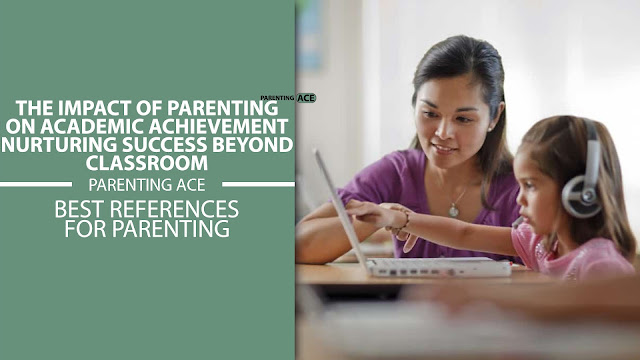The Impact of Parenting on Academic Achievement: Nurturing Success Beyond the Classroom
Unlocking the potential for academic excellence begins not only within the walls of classrooms but also within the sanctity of the home. Welcome to our blog post, where we embark on a journey to uncover the intricate relationship between parenting and academic achievement. From the pivotal role of parental involvement to the nuances of parenting styles and family dynamics, join us as we explore how the guidance, support, and values imparted by parents lay the foundation for success beyond the school gates.
 |
| The Impact of Parenting on Academic Achievement: Nurturing Success Beyond Classroom |
Academic achievement stands as a cornerstone of a child's development, shaping not only their educational journey but also their future opportunities and success in life. While schools and teachers play a vital role, the influence of parenting cannot be overstated. The dynamics of parent-child relationships, the values instilled at home, and the support provided by parents significantly impact a child's academic performance. In this article, we delve into the profound influence of parenting on academic achievement, exploring the mechanisms through which parental involvement, parenting styles, and family dynamics shape children's educational outcomes.
The Role of Parental Involvement
Research consistently highlights the positive correlation between parental involvement and academic achievement. Whether it's helping with homework, attending school events, or engaging in discussions about educational goals, parental involvement fosters a supportive learning environment. Studies indicate that children whose parents are actively engaged in their education tend to exhibit higher levels of motivation, better attendance rates, and improved grades compared to their peers with less parental involvement.
Parenting Styles and Academic Success
Parenting styles, characterized by varying levels of warmth, control, and responsiveness, also play a significant role in shaping academic achievement. Authoritative parenting, which combines high levels of support with reasonable expectations and boundaries, is associated with the most favorable academic outcomes. These parents provide guidance and encouragement while allowing their children to develop independence and critical thinking skills. Conversely, authoritarian and permissive parenting styles may hinder academic success due to either overly strict control or a lack of structure and discipline.
Family Dynamics and Academic Performance
Beyond parenting styles, the overall family environment and dynamics significantly influence academic achievement. A supportive and cohesive family unit, characterized by open communication, shared goals, and mutual respect, fosters a positive attitude towards learning and achievement. Conversely, family conflict, instability, or socioeconomic stressors can impede academic progress by creating distractions, emotional distress, and limited access to resources necessary for learning.
Cultural Considerations
It's essential to recognize that the impact of parenting on academic achievement may vary across cultural contexts. Cultural values, beliefs, and expectations regarding education shape parental attitudes and practices. For instance, in some cultures, academic success is highly prioritized, leading to greater parental involvement and academic pressure on children. In contrast, in other cultures, a more relaxed approach to education may prevail, with an emphasis on holistic development rather than academic performance alone.
In conclusion, the impact of parenting on academic achievement is undeniable. From fostering a supportive learning environment to instilling values of perseverance and self-discipline, parents wield immense influence over their children's educational outcomes. By actively engaging in their child's education, adopting authoritative parenting practices, nurturing a positive family dynamic, and considering cultural nuances, parents can empower their children to excel academically and thrive in all aspects of life. Ultimately, the partnership between parents, schools, and communities is crucial in ensuring that every child has the opportunity to reach their full academic potential and beyond.



Comments
Post a Comment